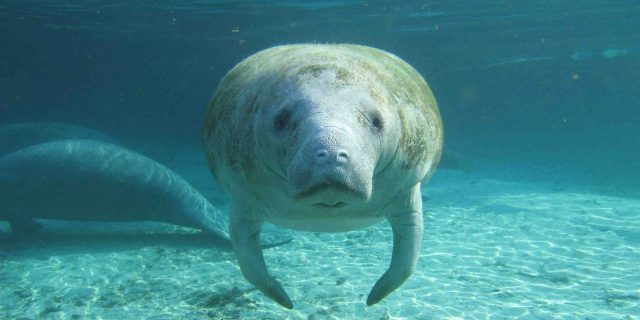16
May
Groups Announce Intent to Sue Fish and Wildlife Service Over Failure to Protect Manatees

(Beyond Pesticides, May 16, 2023) U.S. Fish and Wildlife Service (USFWS) is set to be sued for its failure to implement strong protections for imperiled manatee populations. Earlier this month, the Harvard Animal Law and Policy Clinic, Center for Biological Diversity, Miami Waterkeeper, and engineer Frank González Garcia sent USFWS a notice of intent to sue after USFWS failed to respond to a petition sent by the groups last fall. “It has been months of agony and unjustified time lost for manatees in Puerto Rico,” said Mr. Garcia, an engineer who is concerned with the loss of natural resources. “Recent fatal accidents and unprecedented toxic water discharges aggravate the already precarious living and survival conditions of this beloved species,” Mr. Garcia said.
Recent reporting has captured a dismal situation for manatee populations. The species is under threat from a range of anthropogenic impacts, from boat strikes to harmful herbicide contamination, pollution-driven red tides, and algae blooms that have destroyed seagrass beds the species rely upon. Starvation resulting from the loss of seagrass beds was the cause of death for more than 1,000 manatees in 2021, prompting wildlife officials to feed them cabbage and lettuce as a last resort to keep them alive.
USFWS downgraded protections for the manatee in 2017, moving them from “endangered” status to “threatened,” a move that was widely criticized by conservation groups as premature. A species classified as endangered is in danger of extinction throughout all or a significant a portion of its range, while a threatened classification means the species is likely to become endangered in the foreseeable future. Endangered species are given greater protections than threatened species.
Manatee advocates say that the numbers tell it all: nearly 2,000 manatees died from 2020-2022 from a range of preventable factors. “The science is clear that this species is declining precipitously, and therefore clearly merits uplisting,” Rachel Silverstein, executive director of Miami Waterkeeper. “Reclassifying the manatee as endangered and addressing water quality issues across the state is imperative to all Floridians and our unique wildlife.”
Chemical pollution harming water quality has become a significant threat to manatee habitat. Research finds that marine mammals are genetically vulnerable to the impacts of certain hazardous chemicals due to a lack of traits that assist in breaking down toxic chemicals. Within the context of increased vulnerability, a 2021 study published in Environment International found that manatees living along the U.S. coast experience chronic exposure to glyphosate weed killers. Over 55% of sampled manatees had glyphosate in their bodies in 2020, a number that steadily increased from the beginning of research conducted in 2009.
After submitting the petition, USFWS had 90 days to make a finding in support or against the petition to upgrade the manatee’s status to endangered. With that deadline passed, groups can now formally announce their intent to sue.
A separate lawsuit filed by the Florida-based organization Bear Warriors United is suing the Florida Department of Environmental Protection for permitting human waste disposal through septic and sewage systems to contaminate manatee habitat and harm sea grass. “They never considered that maybe all the seagrass would collapse,” said Lesley Blackner, a Palm Beach attorney representing Bear Warriors, to Florida Today. “What was the hysteria for down-listing it?”
The problems facing manatees and other marine wildlife require a holistic approach and meaningful action. Efforts must be focused on reducing the need to spray toxic pesticides and store waste in a manner that creates environmental contamination.
All unattributed positions and opinions in this piece are those of Beyond Pesticides.
Source: Florida Today, Center for Biological Diversity
Image Source: Wikimedia











It’s heartbreaking to see such a beloved and iconic species like the manatee continue to suffer due to human negligence and policy inaction. The sheer number of preventable deaths in recent years is a clear signal that downgrading their status in 2017 was a grave mistake. The U.S. Fish and Wildlife Service must act now to reclassify the manatee as endangered and implement stronger protections, especially given the threats from water pollution, habitat destruction, and chemical exposure. Thank you to the organizations and individuals pushing for justice and environmental accountability—your advocacy is essential in giving these gentle creatures a fighting chance.
April 5th, 2025 at 10:35 am